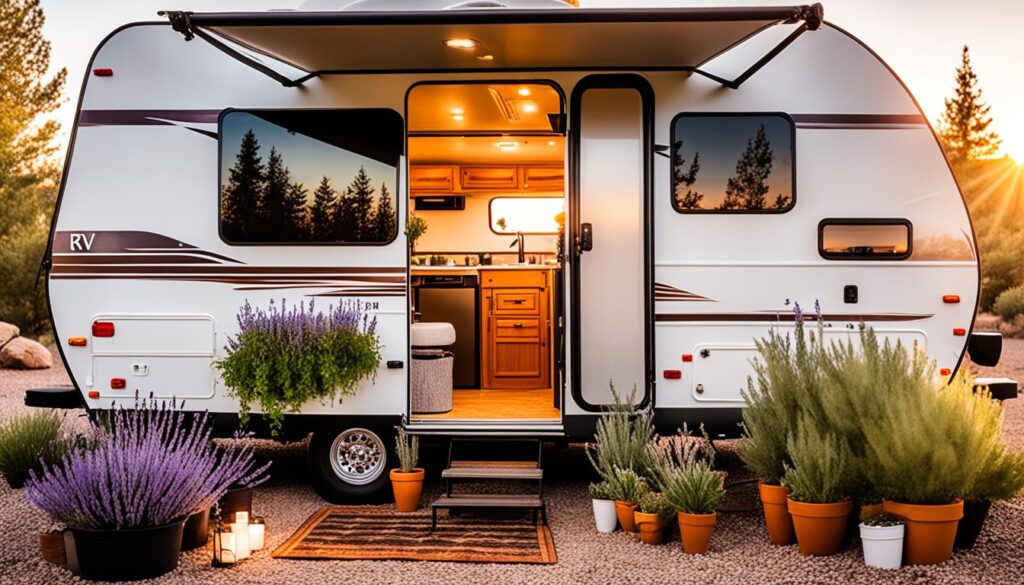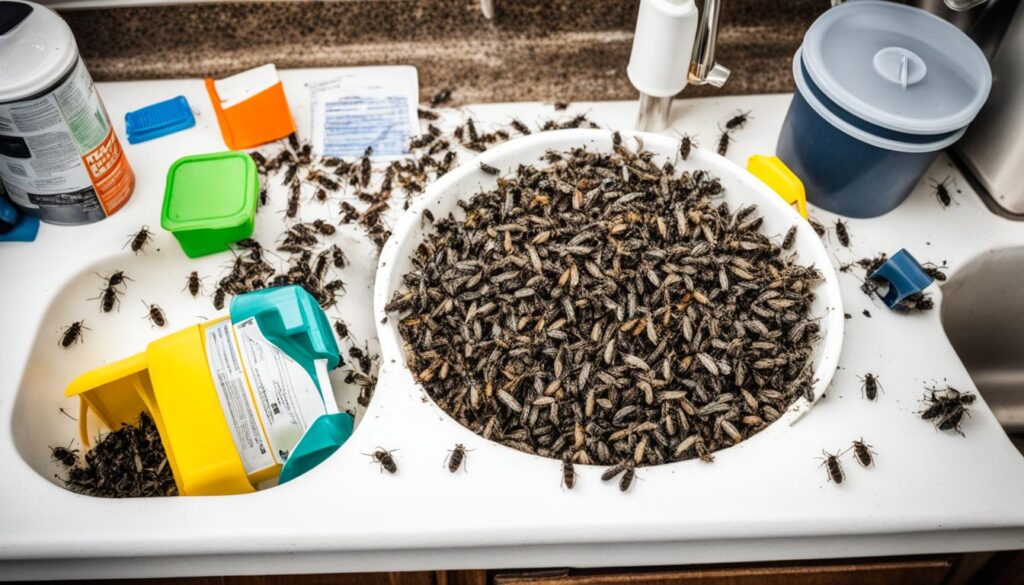Gnats and flies in your RV can be a major nuisance, especially when they come from the toilet and black tank. These pests, also known as sewer flies or drain flies, are attracted to the organic material in sewage and can quickly multiply in favorable conditions. While they are not known to spread diseases to humans directly, they can carry bacteria and contaminate food. To prevent and eliminate a gnat infestation in your RV, it is important to take proactive measures and use effective strategies for control.
Key Takeaways:
- RV sewer flies, also known as drain flies or moth flies, breed in decomposing organic material.
- Preventative measures such as closing tank dump valves and using natural gnat repellents can discourage gnat breeding and entry into your RV.
- Effective ways to eliminate gnats in your RV include treating the black tank with bleach and using enzymatic cleaners or commercial fly traps.
- To maintain long-term gnat control, establish good hygiene practices, seal gaps in the RV’s exterior, and practice proper waste management.
Contents
Understanding RV Sewer Flies
RV sewer flies, also known as drain flies or moth flies, are small insects that breed in decomposing organic material, such as the waste in the black tank and possibly the gray tank of your RV. They are attracted to moisture and light, making them common around drains and toilets. These flies do not bite or sting, and they are poor flyers, typically staying close to their breeding grounds. Although they are not known to spread diseases directly, they can carry bacteria and pose a potential health risk if they contaminate food or come into contact with surfaces in the RV’s kitchen area.
Prolonged exposure to RV sewer flies can lead to health issues, as these pests have the potential to contaminate food and surfaces within your recreational vehicle. It is essential to take preventive measures and implement effective RV gnat control strategies to ensure a safe and enjoyable travel experience.
To address the issue of preventing gnats in recreational vehicles and maintaining RV gnat control, it is important to understand the behavior and habitat of these pests. By knowing their breeding grounds and preferred environments, you can take proactive steps to deter their presence and minimize the risk of infestation. Additionally, having a clear understanding of the potential health risks associated with RV sewer flies will further highlight the importance of effective gnat control in your RV.
Preventing Gnats in Your RV
To prevent gnat infestations in your RV and ensure a comfortable and pest-free environment, there are several proactive measures you can take. By following these tips, you can discourage gnat breeding and deter their entry into your vehicle.
Closing Tank Dump Valves
Closing the tank dump valves and only opening them when actively dumping the tanks is crucial in preventing odors and pests from entering your RV. This simple step significantly reduces the risk of gnat infestations. By keeping the black tank closed, you can also avoid the formation of a “poop pyramid,” which can provide a breeding ground for flies.
Keeping the Gray Tank Valve Closed
It is recommended to keep the gray tank valve closed when not actively using water to prevent gnats from entering through the drains. By sealing off potential entry points, you can minimize the chances of having these annoying pests in your RV.
Using Natural Gnat Repellents
While implementing preventive measures, it is also beneficial to use natural gnat repellents for RVs. Citronella candles or essential oils, such as lemon eucalyptus or lavender, can be effective in deterring gnats and creating a more pleasant environment inside your RV.
By combining these preventative steps and incorporating natural gnat repellents, you can significantly reduce the risk of gnat infestations in your RV and enjoy your travels without the annoyance of these pesky bugs.
Take a look at the table below for a summary of the tips to avoid gnats in your RV:

| Tips to Avoid Gnats in Your RV |
|---|
| Close tank dump valves and only open when actively dumping the tanks |
| Keep the black tank closed to prevent “poop pyramid” formation |
| Keep the gray tank valve closed when not actively using water |
| Use natural gnat repellents like citronella candles or essential oils |
Effective Ways to Eliminate Gnats in RVs
If you’re dealing with a gnat problem in your camper, it’s essential to take immediate action to eliminate these pesky insects. Here are some of the best gnat solutions for RVs:
1. Treat the Black Tank with Bleach
To effectively kill gnat eggs and larvae in the black tank, dilute 1/4 cup of bleach in one gallon of water for every 15 gallons of tank capacity. Pour the mixture down the toilet and let it sit in the tank for at least four hours or overnight. This will help eradicate the gnats, preventing further infestation. Remember to drain and rinse the tank thoroughly afterward.
2. Enzymatic Cleaners
Enzymatic cleaners are another safe and effective option for eliminating gnats in your RV. These cleaners break down organic matter and help control gnat populations. Follow the manufacturer’s instructions for the proper application and dosage.
3. Drain Gels
Drain gels can be used to target gnat breeding grounds in your RV’s plumbing system. Apply a small amount of gel directly into the drains to kill gnats and prevent infestations. Be sure to choose a drain gel specifically designed for eliminating gnats.
4. Commercial Fly Traps
Investing in commercial fly traps can provide an effective solution for trapping and eliminating gnats in your RV. These traps are designed to attract and capture flies, preventing them from roaming freely in your living space. Place the traps strategically in areas where gnats are most active.
5. Maintaining Cleanliness and Hygiene
Regularly clean your RV to remove food residues and potential breeding sites for gnats. Pay special attention to the kitchen and bathroom areas, where gnats are often attracted to moisture and organic matter.
“By following these effective methods, you can say goodbye to gnat problems in your camper and enjoy a pest-free RV experience.”
| Gnat Elimination Methods | Effectiveness | Ease of Use | Cost |
|---|---|---|---|
| Treating the Black Tank with Bleach | High | Moderate | Low |
| Enzymatic Cleaners | Medium | Easy | Medium |
| Drain Gels | High | Easy | Low |
| Commercial Fly Traps | Medium | Easy | Medium |
These methods provide different levels of effectiveness, ease of use, and cost. Choose the one that aligns best with your needs and preferences.

Tips for Long-Term Gnat Control in RVs
To maintain long-term gnat control in your RV, I recommend following these effective ways to eliminate gnats in motorhomes:
1. Establish good hygiene practices and regular maintenance: Regularly clean and sanitize your RV’s pipes and drains with boiling water, vinegar, or baking soda to remove any remaining organic matter that may attract gnats. This simple step can go a long way in preventing gnat infestations.
2. Keep the RV clean and dry: Pay special attention to the kitchen and bathroom areas where gnats are prone to gather. Wipe down surfaces regularly and promptly fix any leaks or moisture issues. Keeping the RV clean and dry will help deter gnats from entering your vehicle.
3. Seal gaps and cracks: Inspect the exterior of your RV for any gaps or cracks where gnats can enter. Seal these openings with silicone caulk or weatherstripping to create a barrier and prevent gnats from getting inside.
4. Practice proper waste management: Minimize the risk of gnat infestations in the black and gray tanks by practicing proper waste management. Keep the dump valves closed when not in use and only open them when actively dumping the tanks. This will help reduce the chances of gnats entering your RV.
By following these tips, you can effectively eliminate gnats in your motorhome and ensure a comfortable and pest-free environment for your travels.
FAQ
How do I get rid of gnats in my RV?
To eliminate gnats in your RV, you can take several effective measures. First, treat the black tank with bleach diluted in water and let it sit for at least four hours. Drain and rinse the tank thoroughly. Alternatively, you can use enzymatic cleaners, drain gels, or commercial fly traps. Regularly clean and sanitize the RV’s pipes and drains, keep the vehicle clean and dry, seal any gaps or cracks in the exterior, and practice proper waste management by keeping the dump valves closed when not in use.
What are RV sewer flies?
RV sewer flies, also known as drain flies or moth flies, are small insects that breed in decomposing organic material, such as waste in the black tank and possibly the gray tank of your RV. They are attracted to moisture and light, making them common around drains and toilets. While they do not bite or sting, they can carry bacteria and pose a potential health risk if they contaminate food or come into contact with surfaces in the RV’s kitchen area.
How can I prevent gnat infestations in my RV?
To prevent gnat infestations in your RV, it is important to take proactive measures. Keep the tank dump valves closed and only open them when actively dumping the tanks to prevent odors and pests from entering the RV. Keep the black tank closed to avoid the formation of a “poop pyramid,” and keep the gray tank valve closed when not using water actively. Use natural gnat repellents, such as citronella candles or essential oils, to deter these pests.
What are the best ways to eliminate gnats in RVs?
If you already have a gnat infestation in your RV, there are several effective solutions. Treat the black tank with diluted bleach or use enzymatic cleaners, drain gels, or commercial fly traps. Follow the manufacturer’s instructions when using these products and take precautions to prevent chemical damage to the RV’s plumbing system.
How can I maintain long-term gnat control in my RV?
To maintain long-term gnat control in your RV, establish good hygiene practices and regular maintenance. Clean and sanitize the RV’s pipes and drains regularly with boiling water, vinegar, or baking soda. Keep the RV clean and dry, especially in the kitchen and bathroom areas. Seal any gaps or cracks in the RV’s exterior to prevent gnats from entering the vehicle. Practice proper waste management by keeping the dump valves closed when not in use to minimize the risk of gnat infestations in the black and gray tanks.






